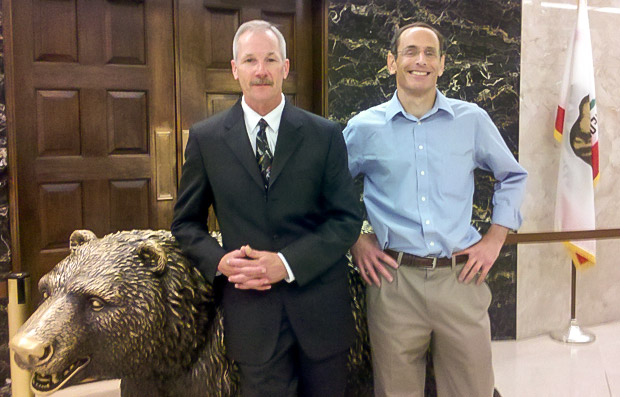
Published Date
Share This:
Faculty, Staff Leaders Travel to State Capitol to Advocate for UC San Diego

David Wargo, chair of the UC San Diego Staff Association, and Joel Sobel, chair of the Academic Senate
Representatives from UC San Diego's Staff Association and Academic Senate visited the state capitol last Tuesday to discuss the significant contributions of staff and faculty to the University of California system and state of California.
The UC system has been rocked by several state budget cuts in recent years, which has had a significant impact on UC San Diego. Tuesday’s meetings provided an opportunity for legislators to meet faculty and staff from UC San Diego and learn how they have been working tirelessly to support the university during this difficult time period.
Chair of the Academic Senate Joel Sobel and Chair of the Staff Association David Wargo participated in roundtable discussions with state legislators and their staff, including Senator Christine Kehoe, D-39 and Assemblymembers Martin Garrick, R-74; Nathan Fletcher, I-75; Toni Atkins, D-76; Marty Block, D-78; and Ben Hueso, D-79.
In the meetings, Sobel and Wargo explained the collaborative work atmosphere on campus and crucial role faculty and staff play at UC San Diego. “We work to create new ideas,” Sobel said.
Both Sobel and Wargo discussed how faculty and staff contribute to UC San Diego’s success as an academic powerhouse and economic engine. UC San Diego is recognized as one of the top 10 public universities by U.S. News & World Report and is ranked No. 1 in the nation for public service by the Washington Monthly. In addition, UC San Diego is the largest employer based in San Diego County with 28,071 full- and part-time employees.
“UC San Diego has produced so much cutting-edge research and that wouldn’t happen without staff,” said Wargo. “Staff help keep everything running. They do everything from changing the light bulbs to supporting students, recycling on campus and designing and building the high-tech equipment that allows researchers to do their work.”
Sobel, a professor in the department of economics in the Division of Social Sciences since 1978, specializes in game theory, one of UC San Diego’s interdisciplinary areas of study. Game theory is a method of studying strategic decision making.
Throughout the meetings, Sobel explained how his research can be used to solve real-world problems, exemplifying one of UC San Diego’s unique research areas: the Design Initiative which is a part of UC San Diego’s strategic plan for the decades ahead. The central idea behind the vision is building on faculty collaboration across disciplines to produce transformative research with societal impact.
This topic was particularly interesting to Assemblyman Hueso. “At the Capitol, we need to know how the research on campus can help us respond to issues plaguing our state,” he said.
Sobel added that if game theorists were consulted when California deregulated the energy market, then there is a good chance the state wouldn’t have had the energy crisis of 2000 and 2001 when Enron manipulated the market.
In a meeting with Assemblyman Block, Sobel, chair of the Assembly Higher Education Committee, talked about the interdisciplinary aspects of his research and how he was recently invited to give a lecture on game theory to electrical engineers at Princeton University.
Wargo, a staff member on campus for 32 years, spoke about his passion for UC San Diego throughout the day. “I love being a part of a university where so many great ideas and innovation have been created,” he said. He also spoke about how the budget cuts have impacted staff.
The University of California system received a $650 million cut for the 2011-12 academic year from the state of California funds for education.
Less than 8 percent of the university's operating budget comes from State of California funds for education. Yet that small investment in UC San Diego results in significant impacts to the campus and region in terms of the economy, healthcare, skilled workforce, businesses, jobs and much more.
For both Sobel and Wargo, the visit to Sacramento marked their first time speaking with state legislators to advocate for UC San Diego.
“I want to help represent the staff as best I can,” Wargo said. “I see the great things these people do at UC San Diego. It’s a really rewarding experience.”
To contact California’s state leaders and support investment in the university, or to sign up to become an advocate (10-second lobbyist), go to: http://advocacy.ucsd.edu.
Share This:
You May Also Like
Stay in the Know
Keep up with all the latest from UC San Diego. Subscribe to the newsletter today.


